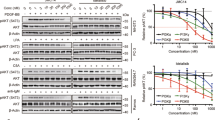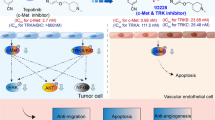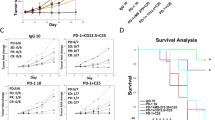Abstract
Colony-stimulating factor 1 receptor (CSF1R) plays a critical role in promoting tumor progression in various types of tumors. Here, we identified D2923 as a novel and selective inhibitor of CSF1R and explored its antitumor activity both in vitro and in vivo. D2923 potently inhibited CSF1R in vitro kinase activity with an IC50 value of 0.3 nM. It exhibited 10- to 300-fold less potency against a panel of kinases tested. D2923 markedly blocked CSF-1-induced activation of CSF1R and its downstream signaling transduction in THP-1 and RAW264.7 macrophages and thus inhibited the in vitro growth of macrophages. Moreover, D2923 dose-dependently attenuated the proliferation of a small panel of myeloid leukemia cells, mainly by arresting the cells at G1 phase as well as inducing apoptosis in the cells. The results of the in vivo experiments further demonstrated that D2923 displayed potent antitumor activity against M-NFS-60 xenografts, with tumor growth inhibition rates of 50% and 88% at doses of 40 and 80 mg/kg, respectively. Additionally, D2923 was well tolerated with no significant body-weight loss observed in the treatment groups compared with the control. Furthermore, a western blot analysis and the immunohistochemistry results confirmed that the phosphorylation of CSF1R in tumor tissue was dramatically reduced after D2923 treatment, and this was accompanied by the depletion of macrophages in the tumor. Meanwhile, the expression of the proliferation marker Ki67 was also markedly decreased in the D2923 treatment group compared with the control group. Taken together, we identified D2923 as a novel and effective CSF1R inhibitor, which deserves further investigation.
Similar content being viewed by others
Log in or create a free account to read this content
Gain free access to this article, as well as selected content from this journal and more on nature.com
or
References
Verstraete K, Savvides SN. Extracellular assembly and activation principles of oncogenic class III receptor tyrosine kinases. Nat Rev Cancer. 2012;12:753–66.
Stanley ER, Chitu V. CSF-1 receptor signaling in myeloid cells. Cold Spring Harb Perspect Biol. 2014;6 a021857.
Jinushi M, Komohara Y. Tumor-associated macrophages as an emerging target against tumors: creating a new path from bench to bedside. Biochim Biophys Acta. 2015;1855:123–30.
Nandi S, Gokhan S, Dai XM, Wei S, Enikolopov G, Lin H, et al. The CSF-1 receptor ligands IL-34 and CSF-1 exhibit distinct developmental brain expression patterns and regulate neural progenitor cell maintenance and maturation. Dev Biol. 2012;367:100–13.
Hume DA, MacDonald KP. Therapeutic applications of macrophage colony-stimulating factor-1 (CSF-1) and antagonists of CSF-1 receptor (CSF-1R) signaling. Blood. 2012;119:1810–20.
Kacinski B. CSF-1 and its receptor in ovarian, endometrial and breast cancer: campaign against ovarian cancer. Ann Med. 1995;27:79–85.
Hambardzumyan D, Gutmann DH, Kettenmann H. The role of microglia and macrophages in glioma maintenance and progression. Nat Neurosci. 2016;19:20–7.
Pyonteck SM, Akkari L, Schuhmacher AJ, Bowman RL, Sevenich L, Quail DF, et al. CSF-1R inhibition alters macrophage polarization and blocks glioma progression. Nat Med. 2013;19:1264–72.
Van Overmeire E, Stijlemans B, Heymann F, Keirsse J, Morias Y, Elkrim Y, et al. M-CSF and GM-CSF receptor signaling differentially regulate monocyte maturation and macrophage polarization in the tumor microenvironment. Cancer Res. 2016;76:35–42.
Elmore MR, Najafi AR, Koike MA, Dagher NN, Spangenberg EE, Rice RA, et al. Colony-stimulating factor 1 receptor signaling is necessary for microglia viability, unmasking a microglia progenitor cell in the adult brain. Neuron. 2014;82:380–97.
Escamilla J, Schokrpur S, Liu C, Priceman SJ, Moughon D, Jiang Z, et al. CSF1 receptor targeting in prostate cancer reverses macrophage-mediated resistance to androgen blockade therapy. Cancer Res. 2015;75:950–62.
Aharinejad S, Abraham D, Paulus P, Abri H, Hofmann M, Grossschmidt K, et al. Colony-stimulating factor-1 antisense treatment suppresses growth of human tumor xenografts in mice. Cancer Res. 2002;62:5317–24.
Conway JG, McDonald B, Parham J, Keith B, Rusnak DW, Shaw E, et al. Inhibition of colony-stimulating-factor-1 signaling in vivo with the orally bioavailable cFMS kinase inhibitor GW2580. Proc Natl Acad Sci USA. 2005;102:16078–83.
Coniglio SJ, Eugenin E, Dobrenis K, Stanley ER, West BL, Symons MH, et al. Microglial stimulation of glioblastoma invasion involves epidermal growth factor receptor (EGFR) and colony stimulating factor 1 receptor (CSF-1R) signaling. Mol Med. 2012;18:519–27.
Strachan DC, Ruffell B, Oei Y, Bissell MJ, Coussens LM, Pryer N, et al. CSF1R inhibition delays cervical and mammary tumor growth in murine models by attenuating the turnover of tumor-associated macrophages and enhancing infiltration by CD8+ T cells. Oncoimmunology. 2013;2:e26968.
Moughon DL, He H, Schokrpur S, Jiang ZK, Yaqoob M, David J, et al. Macrophage blockade using CSF1R inhibitors reverses the vascular leakage underlying malignant ascites in late-stage epithelial ovarian cancer. Cancer Res. 2015;75:4742–52.
Von Tresckow B, Morschhauser F, Ribrag V, Topp MS, Chien C, Seetharam S, et al. An open-label, multicenter, phase I/II study of JNJ-40346527, a CSF-1R inhibitor, in patients with relapsed or refractory Hodgkin lymphoma. Clin Cancer Res. 2015;21:1843–50.
Ries CH, Hoves S, Cannarile MA, Ruttinger D. CSF-1/CSF-1R targeting agents in clinical development for cancer therapy. Curr Opin Pharmacol. 2015;23:45–51.
Garton AJ, Crew AP, Franklin M, Cooke AR, Wynne GM, Castaldo L, et al. OSI-930: a novel selective inhibitor of Kit and kinase insert domain receptor tyrosine kinases with antitumor activity in mouse xenograft models. Cancer Res. 2006;66:1015–24.
Liu G, Campbell BT, Holladay MW, Ford Pulido JM, Hua H, Gitnick D, et al. Discovery of AC710, a globally selective inhibitor of platelet-derived growth factor receptor-family kinases. ACS Med Chem Lett. 2012;3:997–1002.
Ohno H, Kubo K, Murooka H, Kobayashi Y, Nishitoba T, Shibuya M, et al. A c-fms tyrosine kinase inhibitor, Ki20227, suppresses osteoclast differentiation and osteolytic bone destruction in a bone metastasis model. Mol Cancer Ther. 2006;5:2634–43.
DeNardo DG, Brennan DJ, Rexhepaj E, Ruffell B, Shiao SL, Madden SF, et al. Leukocyte complexity predicts breast cancer survival and functionally regulates response to chemotherapy. Cancer Discov. 2011;1:54–67.
Butowski N, Colman H, De Groot JF, Omuro AM, Nayak L, Wen PY, et al. Orally administered colony stimulating factor 1 receptor inhibitor PLX3397 in recurrent glioblastoma: an Ivy Foundation Early Phase Clinical Trials Consortium phase II study. Neuro Oncol. 2016;18:557–64.
Anthony SP, Puzanov PS, Lin KB, Nolop B, West DD. Pharmacodynamicactivity demonstrated in phase I for PLX3397, a selective inhibitor of FMS and Kit. J Clin Oncol. 2011;29:2696.
Genovese MC, Hsia E, Belkowski SM, Chien C, Masterson T, Thurmond RL, et al. Results from a Phase IIA Parallel Group Study of JNJ-40346527, an oral CSF-1R inhibitor, in patients with active rheumatoid arthritis despite disease-modifying antirheumatic drug therapy. J Rheumatol. 2015;42:1752.
Krauser JA, Jin Y, Walles M, Pfaar U, Sutton J, Wiesmann M, et al. Phenotypic and metabolic investigation of a CSF-1R kinase receptor inhibitor (BLZ945) and its pharmacologically active metabolite. Xenobiotica. 2015;45:107–23.
Mao Y, Eissler N, Blanc KL, Johnsen JI, Kogner P, Kiessling R. Targeting suppressive myeloid cells potentiates checkpoint inhibitors to control spontaneous neuroblastoma. Clin Cancer Res. 2016;22:3849–59.
Garcia S, Hartkamp LM, Malvar-Fernandez B, van Es IE, Lin H, Wong J, et al. Colony-stimulating factor (CSF) 1 receptor blockade reduces inflammation in human and murine models of rheumatoid arthritis. Arthritis Res Ther. 2016;18:75.
Nakoinz I, Lee MT, Weaver JF, Ralph P. Differentiation of the IL-3-dependent NFS-60 cell line and adaption to growth in macrophage colony-stimulating factor. J Immunol. 1990;145:860–4.
Sharma P, Hu-Lieskovan S, Wargo JA, Ribas A. Primary, adaptive, and acquired resistance to cancer immunotherapy. Cell. 2017;168:707–23.
Godfrey DI, Le Nours J, Andrews DM, Uldrich AP, Rossjohn J. Unconventional T cell targets for cancer immunotherapy Immunity. 2018;48:453−73.
Andrews MC, Wargo JA. Cancer evolution during immunotherapy. Cell. 2017;171:740−2.
Tap WD, Wainberg ZA, Anthony SP, Ibrahim PN, Zhang C, Healey JH, et al. Structure-guided blockade of CSF1R kinase in tenosynovial giant-cell tumor. N Engl J Med. 2015;373:428–37.
Acknowledgements
This research was partly supported by grants from the “Personalized Medicines, Molecular Signature-based Drug Discovery and Development” and the Strategic Priority Research Program of the Chinese Academy of Sciences (Nos. XDA12020203 and XDA12020209 for HX).
Author contributions
JD, HX, Y-LL, Y-QL, KD, YC, and M-YG designed the study; Y-QL, Y-NW, L-JT, YL, TZ, Y-ZC, FF, YS, and Y-YS performed the research; Q-JX and X-YL contributed the compound; Y-QL, L-JT, Y-LL, and HX analyzed the data; and HX and Y-QL wrote the paper.
Author information
Authors and Affiliations
Corresponding authors
Ethics declarations
Competing interests
We declare that we do not have any commercial or associative interest that represents a conflict of interest in connection with the work submitted.
Rights and permissions
About this article
Cite this article
Liu, YQ., Wang, YN., Lu, XY. et al. Identification of compound D2923 as a novel anti-tumor agent targeting CSF1R. Acta Pharmacol Sin 39, 1768–1776 (2018). https://doi.org/10.1038/s41401-018-0056-0
Received:
Revised:
Accepted:
Published:
Issue date:
DOI: https://doi.org/10.1038/s41401-018-0056-0
Keywords
This article is cited by
-
JMC14: a novel dual PI3Kδ/CSF1R inhibitor with potent antitumor activity in hematological and solid tumors
Acta Pharmacologica Sinica (2025)
-
Targeting tumor-associated macrophages for cancer treatment
Cell & Bioscience (2022)
-
Discovery of a novel third-generation EGFR inhibitor and identification of a potential combination strategy to overcome resistance
Molecular Cancer (2020)
-
C11, a novel fibroblast growth factor receptor 1 (FGFR1) inhibitor, suppresses breast cancer metastasis and angiogenesis
Acta Pharmacologica Sinica (2019)



